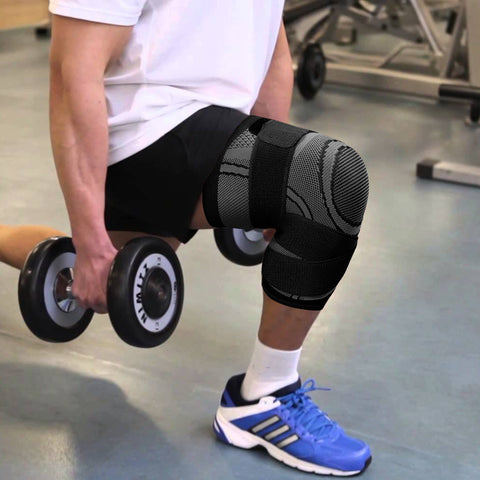What Does a Knee Brace Help With?

A knee brace is a protective garment that is worn around the knee to help with healing, pain relief, stability, and injury prevention. Knee braces are an invaluable aid in maintaining knee health and increasing range of motion, regardless of the cause—an injury, surgery, or long-term medical concerns. This essay will thoroughly examine the numerous advantages and applications of knee braces, highlighting their role in injury prevention and rehabilitation.
Support and Stability

Providing Support for Injured or Weak Knees
Knee braces are a vital tool for supporting weak or injured knees. These braces help reduce pain and suffering by stabilizing the knee joint, particularly when moving or bearing weight. Providing structural support to the surrounding muscles and ligaments of the knee can effectively lessen the load on the joint.
Stabilizing the Knee Joint During Physical Activity
The knee joint is subjected to a variety of stresses and motions during physical activity, which may increase the risk of injury. To stabilize the knee joint during such exercises, knee braces are essential. Knee braces help maintain normal alignment and prevent potential harm by limiting excessive movements, such as twisting or hyperextension. By increasing proprioception, they improve balance and control during motions, which lowers the chance of injury.
Injury Prevention
Reducing the Risk of Knee Injuries during Sports or Exercise
When it comes to lowering the risk of knee injury during sports or exercise, knee braces are essential. These braces reduce the effects of sudden movements or external forces by providing the knee joint with additional support and stability. By providing compression and structural support, knee braces can enhance the knee's overall resilience and reduce the risk of ligament sprains, strains, and other related issues.
Protecting the Knee from Sudden Impacts or Twists
Knee braces serve as a barrier to protect the wearer from twists or unexpected hits that can happen during exercise. Knee braces help cushion the knee joint and prevent overuse injuries by featuring impact absorption padding and stronger stabilizers. These braces effectively protect the knee from potential injury by limiting the range of motion in a controlled manner, allowing users to participate in activities with a lower risk of injury.
Rehabilitation
- Post-Surgical Support: Following surgery, knee braces provide vital stability and alignment, promoting healing and preventing further damage.
- Pain Relief: Braces reduce pressure, edema, and inflammation around the knee joint, making rehabilitation exercises less painful.
- Muscle Rehabilitation: Braces help improve function and stability by providing support for weak muscles, allowing for progressive strengthening.
- Return to Activity: Knee braces lower the risk of re-injury by providing stability and protection for a safe return to physical activity.
Pain Management
- Acute Pain Relief: Knee braces improve comfort during daily activities by lowering swelling, irritation, and pressure on the knee joint.
- Support for Chronic Pain: By enhancing circulation, reducing edema, and providing structural support for increased comfort during movement, braces help manage chronic knee pain.
- Support for Rehabilitation Exercises: Knee braces help in long-term pain management and injury prevention by stabilizing the knee, building muscle, and increasing flexibility.
Knee braces provide support, comfort, and stability, and help manage both acute and chronic knee pain. For optimal and customized brace usage tailored to each patient's pain management needs, professional supervision is essential.
fivalifitness.com
*Disclaimer
The information provided in articles written by Fivali is intended for educational and reference purposes only. The content on this website (www.fivalifitness.com) is not intended to diagnose, treat, cure, or prevent any disease. We do not recommend self-diagnosis or self-treatment based on the information provided in our articles. Always consult a qualified healthcare professional if you have any concerns about your health or well-being.
If you are experiencing any symptoms or discomfort, we strongly recommend seeking medical attention from a qualified healthcare professional. Only a licensed healthcare practitioner can provide an accurate diagnosis and an appropriate treatment plan tailored to your individual needs.













